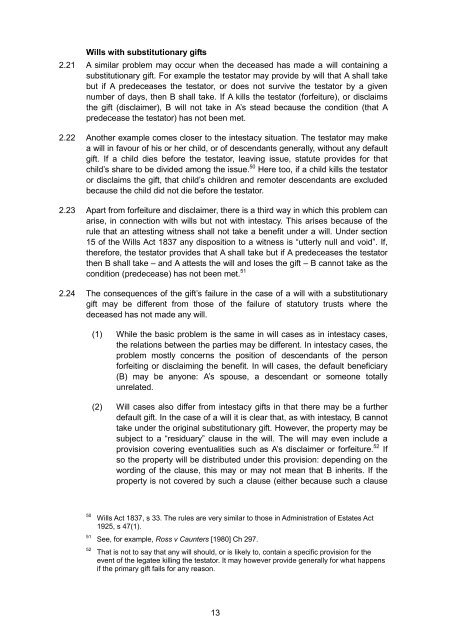The Forfeiture Rule and the Law of Succession ... - Law Commission
The Forfeiture Rule and the Law of Succession ... - Law Commission
The Forfeiture Rule and the Law of Succession ... - Law Commission
You also want an ePaper? Increase the reach of your titles
YUMPU automatically turns print PDFs into web optimized ePapers that Google loves.
Wills with substitutionary gifts<br />
2.21 A similar problem may occur when <strong>the</strong> deceased has made a will containing a<br />
substitutionary gift. For example <strong>the</strong> testator may provide by will that A shall take<br />
but if A predeceases <strong>the</strong> testator, or does not survive <strong>the</strong> testator by a given<br />
number <strong>of</strong> days, <strong>the</strong>n B shall take. If A kills <strong>the</strong> testator (forfeiture), or disclaims<br />
<strong>the</strong> gift (disclaimer), B will not take in A’s stead because <strong>the</strong> condition (that A<br />
predecease <strong>the</strong> testator) has not been met.<br />
2.22 Ano<strong>the</strong>r example comes closer to <strong>the</strong> intestacy situation. <strong>The</strong> testator may make<br />
a will in favour <strong>of</strong> his or her child, or <strong>of</strong> descendants generally, without any default<br />
gift. If a child dies before <strong>the</strong> testator, leaving issue, statute provides for that<br />
child’s share to be divided among <strong>the</strong> issue. 50 Here too, if a child kills <strong>the</strong> testator<br />
or disclaims <strong>the</strong> gift, that child’s children <strong>and</strong> remoter descendants are excluded<br />
because <strong>the</strong> child did not die before <strong>the</strong> testator.<br />
2.23 Apart from forfeiture <strong>and</strong> disclaimer, <strong>the</strong>re is a third way in which this problem can<br />
arise, in connection with wills but not with intestacy. This arises because <strong>of</strong> <strong>the</strong><br />
rule that an attesting witness shall not take a benefit under a will. Under section<br />
15 <strong>of</strong> <strong>the</strong> Wills Act 1837 any disposition to a witness is “utterly null <strong>and</strong> void”. If,<br />
<strong>the</strong>refore, <strong>the</strong> testator provides that A shall take but if A predeceases <strong>the</strong> testator<br />
<strong>the</strong>n B shall take – <strong>and</strong> A attests <strong>the</strong> will <strong>and</strong> loses <strong>the</strong> gift – B cannot take as <strong>the</strong><br />
condition (predecease) has not been met. 51<br />
2.24 <strong>The</strong> consequences <strong>of</strong> <strong>the</strong> gift’s failure in <strong>the</strong> case <strong>of</strong> a will with a substitutionary<br />
gift may be different from those <strong>of</strong> <strong>the</strong> failure <strong>of</strong> statutory trusts where <strong>the</strong><br />
deceased has not made any will.<br />
(1) While <strong>the</strong> basic problem is <strong>the</strong> same in will cases as in intestacy cases,<br />
<strong>the</strong> relations between <strong>the</strong> parties may be different. In intestacy cases, <strong>the</strong><br />
problem mostly concerns <strong>the</strong> position <strong>of</strong> descendants <strong>of</strong> <strong>the</strong> person<br />
forfeiting or disclaiming <strong>the</strong> benefit. In will cases, <strong>the</strong> default beneficiary<br />
(B) may be anyone: A’s spouse, a descendant or someone totally<br />
unrelated.<br />
(2) Will cases also differ from intestacy gifts in that <strong>the</strong>re may be a fur<strong>the</strong>r<br />
default gift. In <strong>the</strong> case <strong>of</strong> a will it is clear that, as with intestacy, B cannot<br />
take under <strong>the</strong> original substitutionary gift. However, <strong>the</strong> property may be<br />
subject to a “residuary” clause in <strong>the</strong> will. <strong>The</strong> will may even include a<br />
provision covering eventualities such as A’s disclaimer or forfeiture. 52 If<br />
so <strong>the</strong> property will be distributed under this provision: depending on <strong>the</strong><br />
wording <strong>of</strong> <strong>the</strong> clause, this may or may not mean that B inherits. If <strong>the</strong><br />
property is not covered by such a clause (ei<strong>the</strong>r because such a clause<br />
50<br />
Wills Act 1837, s 33. <strong>The</strong> rules are very similar to those in Administration <strong>of</strong> Estates Act<br />
1925, s 47(1).<br />
51 See, for example, Ross v Caunters [1980] Ch 297.<br />
52 That is not to say that any will should, or is likely to, contain a specific provision for <strong>the</strong><br />
event <strong>of</strong> <strong>the</strong> legatee killing <strong>the</strong> testator. It may however provide generally for what happens<br />
if <strong>the</strong> primary gift fails for any reason.<br />
13
















